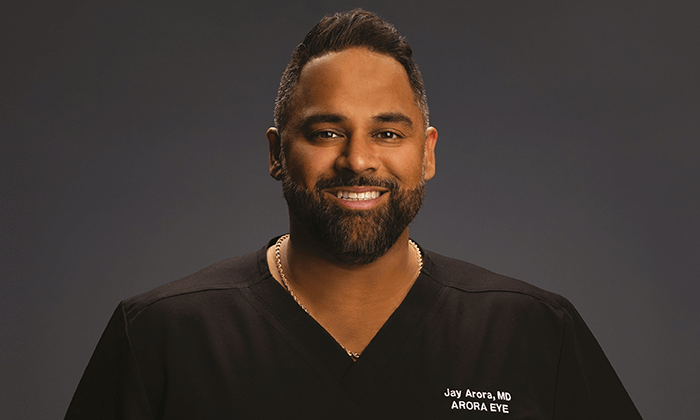
After completing his ophthalmology residency and fellowship in New York City, Jay Arora opened his own private practice, Arora Eye, in Arizona. In part two of this series, Arora shares how valuable the HelpMeSee simulator has been in developing his confidence and ability.
Tell us about your experience with HelpMeSee…
In a solo practice, you are on your own. That is a great thing, but it means that your level of responsibility is much higher. You have to balance the needs of your practice with the best possible visual outcomes for patients. HelpMeSee was really important for me in this regard. I completed the program in a week – spending around 10 hours a day practicing on the simulator – and was able to develop a lot of great cataract surgery skills without any risk to a patient’s vision. The instructor and the simulator also helped me learn to manage complications. It gives you scenarios to figure out; for example, you might have broken the capsular bag and have to determine how best to manage the situation. Those “practice runs” have helped me smoothly address similar complications in real life – improving not just my surgical ability, but also my self-confidence.
Do you use the techniques you learned in your practice now?
Yes – there are a few maneuvers I use regularly. The way I hold my instrument is different now and that has saved time. The training has made my incisions cleaner and my entry points more accessible. I have learned a lot as a surgeon from the simulator training.
What would you say to ophthalmologists who want to explore HelpMeSee?
As ophthalmologists, we always strive for perfection when it comes to our patients’ vision. Unfortunately, until now, the only way to refine our skills was through practice on patients. The HelpMeSee simulator gives you all the benefits of practice without the risk of permanently altering a patient’s vision. I think it is extremely important for surgeons who don’t have a lot of experience to take their time practicing techniques and perfecting their craft. This ensures that, the first time a surgeon steps into the operating room, the scenario is already familiar. I also think a lot of surgery involves mental stability – you need the knowledge (and belief) that you can get through the procedure without making significant mistakes. When you have confidence in your ability to do something, you perform much better. The HelpMeSee simulator feels more like a real eye than an actual eye does. The haptic feedback and the ability to feel as though you are actually inside the eye makes the real-life operating room feel like second nature after simulation-based training.
Do you think simulation is equally helpful in high- and low-resource settings?
Most US Hospitals use makeshift simulators that are ineffective at providing adequate training in skills that translate to the real surgical world. There is no haptic feedback, no visual feedback, and residents often leave the simulator unsure as to whether or not they completed the task correctly. Having finished residency 5 years ago, I have a fairly good understanding of the training curriculum. I think there needs to be a significant push for residency programs in the US and other developed nations to enroll trainees in HelpMeSee simulation-based Centers to further enhance surgical skills. It really does make a significant difference in surgical education, regardless of where in the world a surgeon is training.
